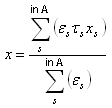Sample_mean
The sample mean is the simple mean of all sample values in an analysis domain.
Let A be the set of samples s in the analysis domain being considered.
If the samples are in decibels then convert them to linear before averaging:
![]()
Where:
xs = The linear value for sample s (Units of x)
Xs = The decibel value for sample s (dB re Units of x)
Calculate the mean as follows:

Where:
= The mean value of all samples in the domain (Units of x) = The linear value for sample s (Units of x) = 0 if sample s is not in the analysis domain 1 otherwise, including bad data (empty water) samples = 0 if sample s is below the specified Minimum threshold. 1 otherwise
If the samples are in decibels then the linear mean is converted back to decibels before reporting it:
![]()
Where:
x = The linear mean as calculated above (Units of x)
X = The sample mean in decibels, Sample_mean (dB re Units of x)
Note:
The Maximum Data threshold set on the Data page of the Variable Properties dialog box will affect the calculation of Sample_mean.
-
If the Maximum threshold is set to No data the thresholded values are excluded from the calculation of Sample_mean.
-
If the Maximum threshold is set to Threshold limit, all samples that are above the maximum threshold are converted to the threshold limit value and included in the Sv mean calculation.
-
Units of x denotes the units of the variable which is being analyzed. For example, for the sample mean of an Sv variable Units of x is m2/m3, for the sample mean of a TS variable Units of x is m2 and so on.
Warning:
Sample_mean is different to Sv_mean. It makes no assumptions regarding or interpretations of the sample data or the physics surrounding its collection (aside from the noted sensitivity to decibel representations). It is not intended for purposes of biomass estimation.
